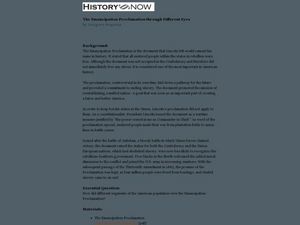Tennessee State Museum
An Emancipation Proclamation Map Lesson
Did the Emancipation Proclamation free all slaves during the Civil War? Why was it written, and what were its immediate and long-term effects? After reading primary source materials, constructing political maps representing information...
Curated OER
The Emancipation Proclamation Through Different Eyes
Students examine how various segments of the American population viewed the Emancipation Proclamation. They read the Emancipation Proclamation, analyze key terms and statements in the document, and participate in a debate.
Reading Through History
The Emancipation Proclamation
The Emancipation Proclamation: one of the most important primary sources for studying American history! An interdisciplinary resource includes a reading of Abraham Lincoln's seminal speech quoted directly. Following the reading, pupils...
Student Handouts
The Emancipation Proclamation
Start your class on the Emancipation Proclamation. The entire text of the Proclamation is included here along with two questions to answer. Space is provided to allow pupils to write their responses right on the page. Use this as a quick...
University of California
The Civil War: Emancipation
Investigate and analyze Abraham Lincoln's Emancipation Proclamation using primary and secondary sources. The sixth installment of an eight-part series analyzes the meaning of Lincoln's document in relation to its impact on the Civil War.
Curated OER
The Emancipation Proclamation
Middle schoolers read one of the most important documents in our nation's history: The Emancipation Proclamation of 1863. After everyone reads the proclamation, they set out to write a "You Were There" type of report on it. They pretend...
Library of Congress
The Emancipation Proclamation and the Thirteenth Amendment
How did the Emancipation Proclamation lead to the Thirteenth Amendment? Middle schoolers analyze primary source documents including the text of the Emancipation Proclamation, political cartoons, photographs, and prints to understand the...
Curated OER
Lincoln and the Emancipation Proclamation: Race Relations in the South
A good outline to a larger project, these slides pose questions about Abraham Lincoln's views, motives, and politics surrounding the Emancipation Proclamation. The discussion questions and key points are helpful in the context of a...
Curated OER
Presidents and the Constitution: Lincoln and the Emancipation Proclamation
Students consider the impact of Lincoln's Emancipation Proclamation In this U.S. Constitution lesson, students read a narrative regarding the move by Lincoln to officially end slavery. Students take notes on the case and respond to...
Tennessee State Museum
Deciphering the Document: Unlocking the Meaning of the Emancipation Proclamation
Help your learners truly understand the Emancipation Proclamation by asking them the put it into their own words. After reading the document out loud to the class, and briefly discussing the legal language, split your class into small...
Curated OER
Juneteenth Proclamation Jubilation
Students research the U.S. holiday Juneteenth and examine the historical elements that contributed to the delayed announcement of the emancipation of slaves in Texas. They recreate a facsimile of the Emancipation Proclamation with the...
American Battlefield Trust
1862: Antietam and Emancipation
Was the Emancipation Proclamation a revolutionary document or just a military strategy? It proclaimed that all those enslaved in Confederate states would be "forever free." Logistically, though, it did little. The order, however,...
K20 LEARN
The Emancipation Proclamation: Expanding The Goals Of The Civil War
Should Juneteenth be recognized as a national holiday? To prepare to take a stance on this question, young historians first analyze the Emancipation Proclamation and compare it to Lincoln's first Inaugural Address. Scholars then read an...
Curated OER
Active Viewing: Abraham and Mary Lincoln: A House Divided
Young historians consider the cause and effects of the Emancipation Proclamation. They use handouts, response sheets, and class discussion to build an opinion about the subject after viewing the PBS documentary Abraham and Mary Lincoln:...
Curated OER
Lincoln, Emancipation, and the Constitution
Learners determine how President Lincoln promoted emancipation. In this slavery lesson, students examine primary documents, including the U.S. Constitution, to reconstruct Lincoln's attempts to end slavery and deliver the Emancipation...
American Battlefield Trust
1862: Antietam and Emancipation
The Emancipation Proclamation shifted the tone and purpose of the Civil War. Using a primary source analysis, pupils consider the significance of the document. A second activity investigates the founding of the United States Colored...
Curated OER
The Emancipation Proclamation
Students explore the historical importance of the Emancipation Proclamation. In this United States History instructional activity, students use the internet to research the specific events that were centered around the Emancipation...
Curated OER
Emancipation Proclamation
Students analyze key components of a portrait and relate the elements to the historical context. In this lesson students evaluate the "Emancipation Proclamation" and it's significance.
Curated OER
Attitudes Toward Emancipation
Students read the Emancipation Proclamation and investigate steps that led to its signing. They read and discuss period news articles from both sides of the argument and create portfolios of documentation supporting both sides.
Library of Virginia
Emancipation and the Thirteenth Amendment
Why didn't the Emancipation Proclamation free all slaves? Young historians study primary source documents including Lincoln's proclamation and the 13th Amendment to the United States Constitution. Groups also investigate the three...
Curated OER
Emancipation Proclamation
Students examine the Emancipation Proclamation. In this Emancipation Proclamation instructional activity, students examine the document and respond to 6 questions regarding it.
Curated OER
Hoosier Soldiers and the Emancipation Proclamation
Eighth graders examine the impact of Lincoln's Emancipation Proclamation through the eyes of Indiana soldiers. In this American Civil War lesson plan, 8th graders read the proclamation and then students write essays that included letters...
Curated OER
Exploring the Eras of the Emancipation Proclamation and the Civil Rights Movement
Eighth graders utilize many sources (books, computer, magazines, etc...) to research the eras of the Emancipation Proclamation and Civil Rights Movement and create a T-Chart comparison.
National Park Service
Freedom at Antietam
Explore how the issuance of the Emancipation Proclamation affected everyday individuals in the Civil War era. Learners are given the opportunity to read and evaluate primary and secondary source material, and then to compose a writing...

























